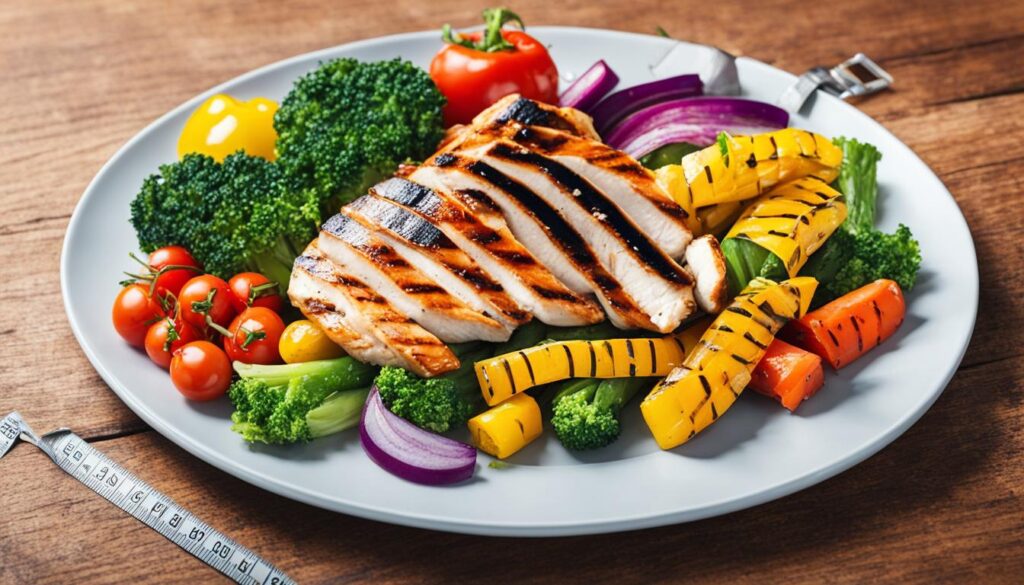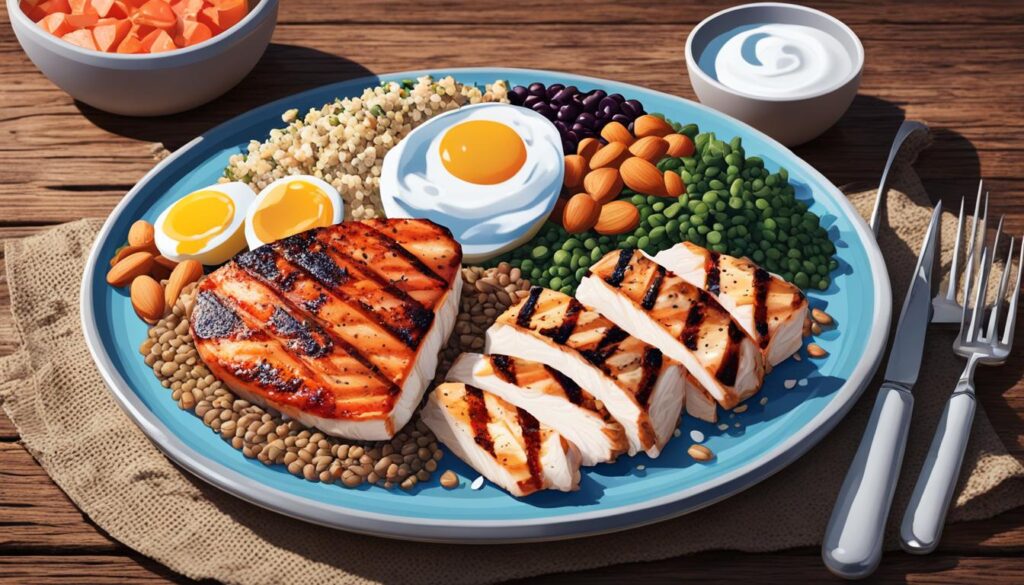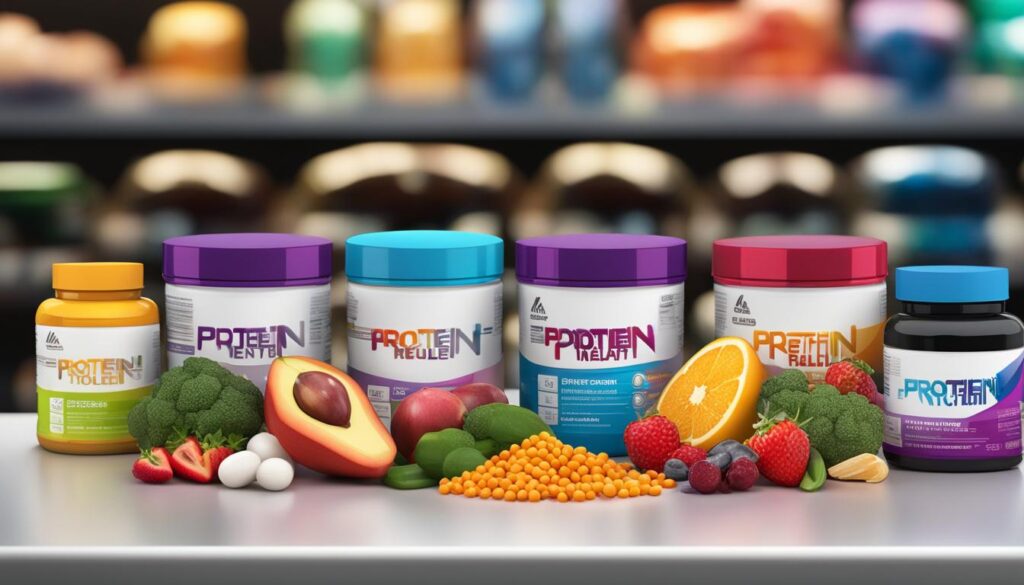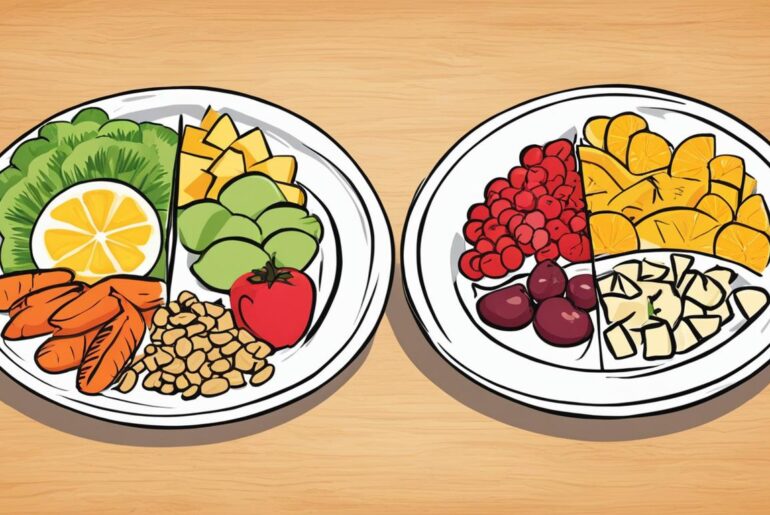If you’re looking to shed those extra pounds, you may be wondering how much protein you should be consuming. Protein intake plays a crucial role in weight loss and can help you achieve your goals more effectively. But how much protein is enough? Let’s explore the optimal protein intake for weight loss and some practical tips to calculate your protein needs.
Key Takeaways:
- Protein is essential for weight loss as it promotes feelings of fullness and helps preserve lean body mass.
- The recommended protein intake for weight loss ranges from 10% to 35% of daily calories.
- Use the USDA DRI Calculator to determine your personalized protein needs based on your age, weight, activity level, and more.
- Consult with a registered dietitian or healthcare provider for personalized advice and recommendations.
- Incorporate protein-rich foods into your diet, such as lean meats, dairy products, legumes, grains, and tofu (see my post here).
Protein and Weight Loss
When it comes to weight loss, protein plays a crucial role in achieving your goals. Incorporating protein into your diet can have numerous benefits, including appetite control, preservation of lean body mass, and increased calorie burning. Let’s delve deeper into how protein can support your weight loss journey.
Protein’s Effect on Appetite and Fullness
One of the key advantages of protein is its ability to increase feelings of fullness and reduce appetite. When you consume protein-rich foods, they take longer to digest, keeping you satisfied for a longer period. This can help prevent overeating and reduce snacking, ultimately leading to a decrease in calorie intake.
Preserving Lean Body Mass with Protein
During weight loss, it’s essential to preserve lean body mass, which includes muscles, bones, and organs. Protein plays a vital role in this process by providing the necessary building blocks for muscle maintenance and repair. By consuming adequate protein, you can minimize muscle loss and preserve your metabolic rate, making it easier to maintain weight loss in the long term.
Protein’s Impact on the Thermic Effect of Food
Did you know that protein has a higher thermic effect of food than carbohydrates and fats? This means that your body burns more calories during the digestion and absorption of protein-rich foods. By incorporating protein into your meals, you can increase your calorie expenditure and potentially enhance weight loss.
Image here:
Protein and Storing Less Body Fat
Unlike carbohydrates and fats, protein is less likely to be stored as body fat. When you consume excess carbohydrates or fats, they can be readily converted and stored in your body. Protein, on the other hand, has a higher thermic effect, requires more energy to digest, and is less likely to be converted into body fat. By focusing on protein-rich foods, you can reduce the storage of excess body fat and support your weight loss efforts.
Incorporating protein into your weight loss diet can offer significant advantages. By controlling appetite, preserving lean body mass, increasing calorie burning, and minimizing body fat storage, protein sets the stage for effective and sustainable weight loss. Stay tuned for more insights on protein requirements and sources to support your weight loss journey.
Protein Requirements for Weight Loss

To achieve successful weight loss, it is crucial to understand the protein requirements specific to your individual needs. The recommended daily protein intake for weight loss varies based on several factors including age, gender, activity level, and overall health. Experts suggest that protein should contribute to 10% to 35% of your daily calorie intake.
When aiming for weight loss, it is important to maintain a calorie deficit, which means consuming fewer calories than you burn. Protein can play a significant role in achieving this deficit while promoting muscle gain during weight loss.
To determine the optimal protein intake for your weight loss goals, it is highly recommended to consult with a healthcare professional or registered dietitian. These experts can provide personalized advice based on your specific needs, ensuring that you meet your protein requirements while maintaining a calorie deficit.
By setting realistic protein intake goals and working closely with a professional, you can effectively use protein to support your weight loss journey while ensuring your nutritional needs are met.
How to Calculate Protein Intake for Weight Loss
Calculating your protein intake for weight loss is essential to ensure you’re meeting your nutritional needs and supporting your weight loss goals. One effective tool you can use is the USDA DRI Calculator, which provides personalized recommendations based on factors such as height, weight, age, sex, and activity level.
By utilizing the USDA DRI Calculator, you can determine how much protein you should be consuming each day to support your weight loss journey. This calculator takes into account various factors that influence your protein needs, allowing you to establish a specific target protein intake.
To calculate your protein needs using the USDA DRI Calculator, follow these steps:
- Visit the USDA DRI Calculator website.
- Enter your personal information, including height, weight, age, sex, and activity level.
- Specify your weight goal if prompted.
- Review the recommended daily intake of protein tailored to your profile.
By following these steps and using the USDA DRI Calculator, you can determine the ideal protein intake for your weight loss journey. It’s important to note that individual protein requirements may vary, and it’s always advisable to consult with a healthcare professional or registered dietitian to receive personalized advice based on your specific needs.
Monitor and Adjust as Needed
While the USDA DRI Calculator provides a useful starting point, it’s crucial to monitor your progress and make adjustments as necessary. Throughout your weight loss journey, you may need to reassess your protein intake based on various factors, such as changes in activity level, muscle mass, or overall health.
Remember, maintaining an appropriate protein intake is just one component of a comprehensive weight loss approach. Combining it with a balanced diet and regular exercise is key to achieving long-term success.
Protein Intake for Active Individuals and Athletes

Active individuals and athletes have higher protein needs due to their increased calorie requirements. To support their demanding training and ensure optimal performance, it is recommended for them to consume approximately 1 to 1.5 grams of protein per pound of their goal weight. However, it is important to note that exact protein needs may vary based on the type and intensity of activity.
Timing of protein consumption is also crucial for active individuals and athletes. A balanced distribution of protein throughout the day, especially before and after workouts, can enhance muscle recovery and growth. Consuming protein-rich foods or supplements within 1-2 hours of exercise is recommended to maximize the body’s ability to use the protein for repairing and building muscles.
Consulting with a healthcare professional or registered dietitian can provide valuable guidance in determining the appropriate protein intake for active individuals and athletes. They can take into consideration specific factors such as training intensity, duration, and individual goals to develop a personalized nutrition plan that optimizes performance and supports overall health.
| Activity Level | Protein Intake Recommendation |
|---|---|
| Regular Exercise (Non-competitive) | 1 gram of protein per pound of goal weight |
| Moderate-Intensity Training (Competitive) | 1.2 to 1.4 grams of protein per pound of goal weight |
| High-Intensity Training (Elite Athletes) | 1.4 to 1.8 grams of protein per pound of goal weight |
Key Points:
- Active individuals and athletes require higher protein intake due to their increased calorie needs.
- Protein consumption of 1 to 1.5 grams per pound of goal weight is commonly recommended.
- Timing of protein consumption, especially around workouts, can enhance muscle recovery and growth.
- Consulting with a healthcare professional or registered dietitian can help determine individual protein needs for optimal performance.
Benefits of Protein for Weight Loss
Protein offers several benefits for weight loss. Let’s explore how protein can support your weight loss journey:
1. Impact on Appetite and Fullness
Protein is known to increase feelings of fullness, helping to curb cravings and reduce snacking. By incorporating protein-rich foods into your meals and snacks, you can promote satiety and potentially lower your overall calorie intake.
2. Preservation of Lean Body Mass
During weight loss, it’s common to experience some loss of muscle mass. However, consuming an adequate amount of protein can help preserve lean body mass. This is important because more muscle means a higher metabolic rate, allowing you to burn more calories even at rest.
3. Effect on Calorie Burning
Protein has a higher thermic effect of food compared to carbohydrates and fats. This means that your body burns more calories during the digestion, absorption, and metabolism of protein. By increasing your protein intake, you can increase your calorie burning potential.
4. Role in Storing Less Body Fat
When compared to carbohydrates and fats, protein is less likely to be stored as body fat. This is because protein has a higher thermic effect and requires more energy to be metabolized. By prioritizing protein in your diet, you can potentially store less body fat during weight loss.
To harness these benefits of protein for weight loss, incorporate protein-rich foods such as lean meats, poultry, fish, eggs, dairy products, legumes, nuts, and seeds into your diet. Aim for a well-rounded and balanced approach that meets your individual protein needs.
“Protein not only helps you feel full and satisfied, but it also plays a crucial role in preserving lean body mass and boosting calorie burning. By including protein-rich foods in your weight loss diet, you can enhance your results and achieve your goals more effectively.”
| Benefits of Protein for Weight Loss |
|---|
| Increases feelings of fullness and reduces snacking |
| Preserves lean body mass during weight loss |
| Increases calorie burning through the thermic effect |
| Less likely to be stored as body fat compared to carbs and fats |
Healthy Sources of Protein

When it comes to incorporating protein into your weight loss diet, there are numerous healthy and affordable options to choose from. Whether you prefer animal-based or plant-based protein sources, there is a wide range of foods that can provide the protein your body needs. Here are some recommended protein-rich foods to consider:
Animal-Based Protein Sources
- Meats: Lean cuts of beef, chicken, turkey, and pork.
- Eggs: A complete protein source that is versatile and nutrient-rich.
- Dairy Products: Milk, yogurt, and cheese are excellent sources of protein, calcium, and other essential nutrients.
- Fish and Seafood: Salmon, tuna, shrimp, and other seafood options are not only high in protein but also rich in heart-healthy omega-3 fatty acids.
Plant-Based Protein Sources
- Legumes: Beans, lentils, and peas are not only high in protein but also rich in fiber, vitamins, and minerals.
- Nuts: Almonds, walnuts, peanuts, and other nuts are a great source of protein, healthy fats, and antioxidants.
- Grains: Quinoa, brown rice, oats, and whole wheat products are protein-rich alternatives to refined grains.
- Seeds: Chia seeds, flaxseeds, hemp seeds, and pumpkin seeds are packed with protein, healthy fats, and essential minerals.
- Tofu: A versatile plant-based protein option that can be used in various dishes, including stir-fries and salads.
It’s important to include a variety of these protein-rich foods in your diet to ensure you’re getting all the essential amino acids your body needs. By incorporating both animal-based and plant-based options, you can enjoy a well-rounded and nutritious protein intake for weight loss.
Remember, the key to a successful weight loss journey is maintaining a balanced and varied diet. Consult with a registered dietitian or healthcare provider to get personalized advice based on your individual needs and any medical conditions you may have. They can help you create a meal plan that incorporates healthy sources of protein and supports your weight loss goals.
Protein Supplements

Protein supplements can be a convenient option when you’re looking for a quick and easy source of protein. Whether you’re fueling your workouts or seeking a meal replacement, protein supplements can provide an additional boost to your weight loss journey. However, it’s important to keep in mind that these supplements are not regulated by the FDA, and they may not offer the same array of essential nutrients found in whole foods.
When choosing protein supplements for weight loss, consider products that contain at least 10 to 15 grams of protein per serving. Opt for options with low carbohydrates and fewer than 200 to 250 calories per serving. Additionally, minimizing the amount of added sugar in your protein supplement can help you better align with your weight loss goals.
“Protein supplements can be a convenient option for individuals looking to optimize their protein intake for weight loss.”
| Considerations when choosing protein supplements |
|---|
| Protein content per serving (at least 10 to 15 grams) |
| Low carbohydrate content |
| Fewer than 200 to 250 calories per serving |
| Minimal added sugar |
While protein supplements can be a valuable addition to your weight loss journey, it’s always recommended to prioritize whole, nutrient-rich foods as the main source of protein. These foods provide a more complete nutritional profile and offer additional health benefits beyond protein content.
High-Protein Diet Considerations

While a high-protein diet can be beneficial for weight loss, it’s important to consider certain health conditions. One such condition is kidney disease. Individuals with kidney disease or those on dialysis should exercise caution and avoid high-protein diets. Excess protein can put stress on the kidneys and potentially worsen the condition.
Kidneys play a vital role in filtering waste products from the blood and maintaining fluid balance. When protein is metabolized, it produces waste products that need to be eliminated by the kidneys. In individuals with kidney disease, the impaired kidney function can make it difficult to process and eliminate these waste products efficiently.
Monitoring protein intake is crucial for kidney health. It’s necessary to follow personalized nutrition recommendations from a healthcare professional or registered dietitian to ensure the protein intake aligns with the specific needs of individuals with kidney disease. They can provide guidance on the appropriate amount of protein and the best sources to include in the diet.
By carefully monitoring protein intake, individuals with kidney disease can effectively manage their condition and optimize their overall health. It’s essential to prioritize the guidance of healthcare professionals who can provide tailored advice based on individual needs and any other medical conditions present.
Remember, protein’s impact on kidney function is a significant consideration for individuals with kidney disease. Consult with healthcare professionals to ensure a well-balanced diet that supports overall health and well-being.
Maintaining Weight Loss
Achieving and maintaining weight loss involves more than just protein intake (see my post here). It’s important to adopt healthy lifestyle habits to support weight maintenance. Regular exercise plays a significant role in sustaining weight loss and overall health. It helps burn calories, build lean muscle, and improve metabolic rate.
To successfully maintain weight loss, it’s crucial to continue maintaining a calorie deficit. This means consuming fewer calories than you burn through physical activity and daily functions. It’s advisable to consult with a healthcare professional or registered dietitian to determine the appropriate calorie deficit for your individual needs and goals.
Protein is an essential nutrient that can assist in weight maintenance. It provides satiety, helping to control hunger and prevent overeating. Additionally, protein supports muscle growth and repair, which is vital for maintaining a healthy body composition.
However, it’s important to note that weight maintenance requires a comprehensive approach that includes healthy eating, regular exercise, and behavior modifications. Adopting long-term lifestyle changes is key to sustaining weight loss and achieving optimal health.
The Importance of Exercise for Weight Maintenance
Regular exercise is crucial for maintaining weight loss. It helps boost metabolism, burn calories, and preserve lean muscle mass. By engaging in both cardiovascular exercises and strength training, individuals can enhance their overall fitness and improve body composition.
Cardiovascular exercises, such as jogging, cycling, or swimming, help burn calories and improve cardiovascular health. Strength training exercises, such as weightlifting or bodyweight exercises, help build and maintain lean muscle mass, which is essential for maintaining a healthy metabolism.
It’s recommended to incorporate a combination of aerobic and strength training exercises into your routine. Aim for at least 150 minutes of moderate-intensity aerobic activity or 75 minutes of vigorous-intensity aerobic activity per week, along with two or more days of strength training. Consulting with a fitness professional can provide personalized exercise recommendations based on your fitness level, preferences, and goals.
Maintaining a Calorie Deficit
Maintaining a calorie deficit is crucial for sustained weight loss. To continue losing weight or prevent weight regain, it’s important to consume fewer calories than you burn. This can be achieved through a combination of dietary modifications and increased physical activity.
Tracking your daily calorie intake and expenditure can help you monitor your calorie deficit. There are various mobile apps and online tools available to assist with calorie tracking. Consulting with a registered dietitian can provide personalized guidance and support in creating a calorie deficit plan that suits your individual needs and lifestyle.
Benefits of Protein for Nutrient Needs and Health Goals
Protein is an important nutrient for maintaining weight loss and overall health. It not only supports muscle growth and repair but also provides essential amino acids necessary for various bodily functions.
In addition to its role in weight maintenance, protein offers several other benefits. It helps regulate appetite, as it has a high satiety value, which can prevent overeating. Protein also supports a healthy immune system, aids in the production of enzymes and hormones, and contributes to the maintenance of healthy skin, hair, and nails.
Incorporating protein-rich foods into your diet can help meet your nutrient needs and support your health goals. It’s important to choose lean sources of protein, such as poultry, fish, legumes, and low-fat dairy products, to minimize saturated fat intake. Consulting with a registered dietitian can provide personalized recommendations on protein intake and sources based on your specific dietary needs and preferences.
Consulting with a healthcare professional or registered dietitian is essential for personalized guidance on maintaining weight loss and achieving optimal health.
Will Eating One Meal a Day Help Me Achieve My Protein Intake for Weight Loss?
If you are considering eating one meal daily weight loss, it may not be the best approach for achieving your protein intake. Dividing your protein across multiple meals can help with muscle retention and keeping you full. Consider consulting a nutritionist for personalized advice.
Conclusion
In conclusion, protein intake plays a vital role in weight loss and muscle gain. The amount of protein needed for weight loss varies depending on individual factors such as age, gender, activity level, and overall health. Including an adequate amount of protein in your diet can help promote feelings of fullness, preserve lean body mass, increase calorie burning, and reduce body fat storage.
To determine your specific protein needs, it is recommended to use reputable resources like the USDA DRI Calculator. However, seeking personalized advice from a healthcare professional or registered dietitian is crucial to ensure your protein intake is tailored to your individual needs and any underlying medical conditions.
By incorporating protein-rich foods and following personalized protein recommendations, you can effectively achieve your weight loss goals. Remember that protein is just one component of a balanced and healthy lifestyle. It’s essential to adopt other healthy habits, such as regular exercise, to maintain weight loss in the long term. Consultation with a healthcare professional or registered dietitian is advised to receive comprehensive guidance on maintaining weight loss and achieving optimal health.
FAQ
How much protein should I be eating to lose weight?
The amount of protein you should eat to lose weight depends on various factors such as age, muscle mass, overall health, and activity level. The recommended percentage of daily calories from protein is typically 10% to 35%. To determine your specific protein needs, you can use the USDA DRI Calculator, which takes into account your height, weight, age, sex, and activity level. It’s important to consult with a registered dietitian or healthcare provider to get personalized advice based on your individual needs and any medical conditions you may have.
What role does protein play in weight loss?
Protein plays a crucial role in weight loss. It can help you feel full longer, reduce snacking, and potentially reduce calorie intake. Additionally, protein helps preserve lean body mass while losing weight and has a higher thermic effect of food, meaning your body burns more calories digesting protein compared to carbohydrates and fats. Moreover, protein is less likely to be stored as body fat compared to other macronutrients. Incorporating protein-rich foods into your diet can be beneficial for weight loss.
What are the recommended protein requirements for weight loss?
The recommended daily protein intake for weight loss varies based on individual factors such as age, gender, activity level, and overall health. Experts suggest that 10% to 35% of daily calories should come from protein. It’s essential to maintain a calorie deficit to lose weight, and protein can help support muscle gain during weight loss. Consulting a healthcare professional or registered dietitian can help determine the optimal protein intake for your weight loss goals and individual needs.
How can I calculate my protein intake for weight loss?
To calculate your protein intake for weight loss, you can use the USDA DRI Calculator. This online calculator takes into account your height, weight, age, sex, and activity level to provide personalized recommendations for macronutrient intake, including protein. By entering your information into the calculator, you can determine your daily protein needs for weight loss. It’s important to note that individual protein requirements may vary, and consulting a healthcare professional for personalized advice is recommended.
What is the protein intake recommendation for active individuals and athletes?
Active individuals and athletes have higher protein needs due to increased calorie requirements. The protein intake for these individuals is generally recommended to be 1 to 1.5 grams per pound of their goal weight. The specific protein needs may vary depending on the type and intensity of activity. It is also important to consider the timing of protein consumption for optimal muscle recovery and growth. Consulting with a healthcare professional or registered dietitian can help determine the appropriate protein intake for active individuals and athletes.
What are the benefits of protein for weight loss?
Protein offers several benefits for weight loss. It increases feelings of fullness and can help reduce snacking and overall calorie intake. Protein also helps preserve lean body mass, preventing muscle loss during weight loss. Additionally, protein has a higher thermic effect of food, meaning it requires more calories to digest, absorb, and metabolize, leading to increased calorie burning. Moreover, protein is less likely to be stored as body fat compared to carbohydrates and fats. These benefits make protein an important component of a weight loss diet.
What are some healthy sources of protein?
There are many healthy and affordable sources of protein available. Animal-based protein sources such as meats, eggs, dairy products, fish, and seafood provide high-quality protein that is easily absorbed and utilized by the body. Plant-based protein sources such as legumes, nuts, grains, seeds, and tofu are also excellent options. It’s important to include a variety of protein-rich foods in your diet to ensure you’re getting all the essential amino acids. Incorporating these recommended protein sources into your meals can help meet your protein needs for weight loss.
Are protein supplements beneficial for weight loss?
Protein supplements can be a convenient option when you need a quick source of protein. However, it’s important to note that supplements are not regulated by the FDA and may lack other essential nutrients found in whole foods. Protein supplements can be useful for fueling workouts or as a meal replacement in certain situations, such as when you’re unable to eat a balanced meal. When choosing protein supplements, it’s recommended to look for products that contain at least 10 to 15 grams of protein per serving, low carbohydrates, fewer than 200 to 250 calories, and minimal added sugar. It’s always best to prioritize whole, nutrient-rich foods as the main source of protein in your weight loss diet.
Are there any considerations for a high-protein diet?
While a high-protein diet can be beneficial for weight loss, it’s important to consider certain health conditions. Individuals with kidney disease or those on dialysis should avoid high-protein diets as excess protein can put stress on the kidneys. It’s essential to monitor protein intake and follow personalized nutrition recommendations from a healthcare professional or registered dietitian if you have kidney disease or any other medical conditions that may impact protein needs.
How can I maintain weight loss?
Achieving and maintaining weight loss involves more than just protein intake. It’s important to adopt healthy lifestyle habits, including regular exercise, to support weight maintenance. Additionally, maintaining a calorie deficit, where you burn more calories than you consume, is crucial for sustained weight loss. Protein plays a role in meeting your nutrient needs and health goals, but overall lifestyle changes are necessary for successful weight maintenance. It’s advisable to consult with a healthcare professional or registered dietitian for personalized guidance on maintaining weight loss.
What is the conclusion on protein intake for weight loss?
Protein intake is essential for weight loss and muscle gain. The recommended protein intake for weight loss varies based on individual factors such as age, gender, activity level, and overall health. Protein helps promote feelings of fullness, preserves lean body mass, increases calorie burning, and reduces body fat storage. It’s important to calculate your specific protein needs using reputable resources like the USDA DRI Calculator and consult with a healthcare professional or registered dietitian for personalized advice based on your individual needs and any medical conditions you may have. By incorporating protein-rich foods and following personalized protein recommendations, you can effectively lose weight and achieve your health goals.
Source Links
- https://health.clevelandclinic.org/how-much-protein-to-eat-to-lose-weight
- https://www.strengthlog.com/protein-calculator/
- https://www.healthline.com/nutrition/high-protein-diet-plan




